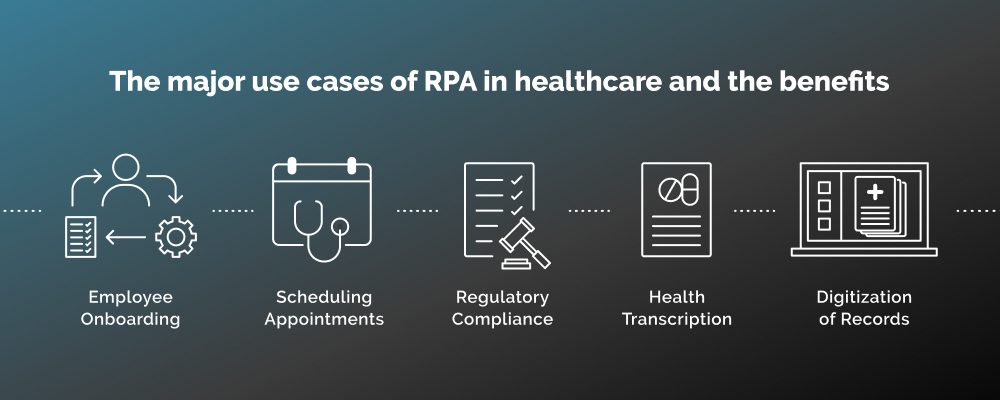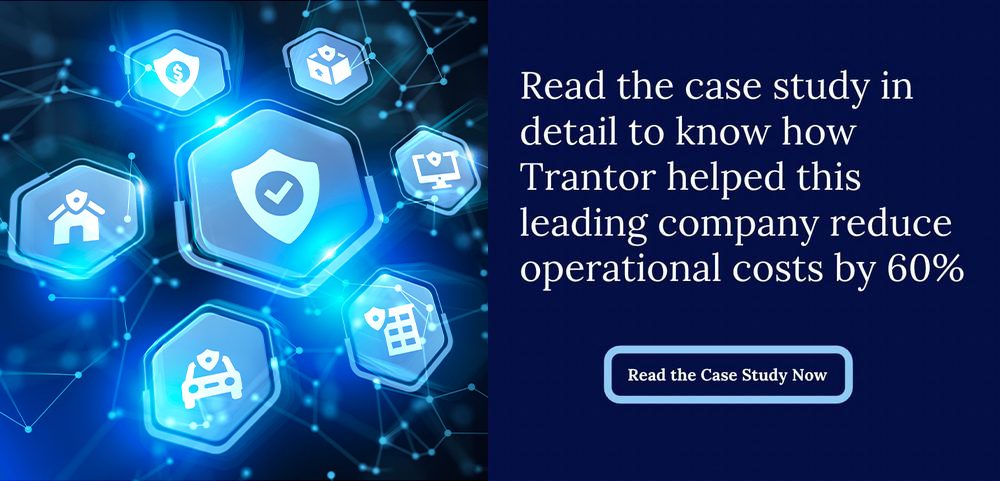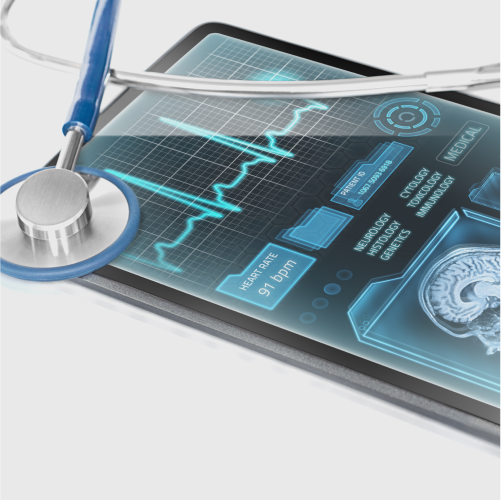Automation, zBlog
RPA in Healthcare: Benefits, Use-Cases and Road Ahead
trantorindia | Updated: June 28, 2022

The World Health Organization (WHO) predicts that by 2030 there will be an estimated shortage of around 18 million-person in the health workforce, leaving in-person medical treatments a luxury only a few people can afford. The COVID-19 pandemic has only made matters worse, but thanks to RPA in healthcare good days are here again.
An average cost of $7.13 million is associated with a healthcare data breach. According to one of the renowned Security’s 2020 data breach cost study, that represented an increase of more than 10% in 2020, when the average data breach cost healthcare firms $6.45 million. With the COVID-19 epidemic, this issue has become even more apparent, as the number of people seeking medical help increased exponentially. Today’s healthcare industry is swamped with high expenses, a massive volume of patients, and strict regulations. These demands may make it difficult to provide high-quality, timely care to patients.
Healthcare systems all around the world are constantly striving to develop and expand in order to reach consumers who use their services. Healthcare care services of high quality and availability for populations with a wide range of requirements present a number of operational and organizational concerns.
On the one hand, businesses encounter operational issues such as handling sensitive data, adhering to specific processes when handling paperwork, maintaining health information, and so on. While patient care is the priority, doctors, nurses, and other personnel are frequently entrusted with administrative responsibilities that must be accomplished in order for them to concentrate on the patient.
RPA (Robotic Process Automation)

Robotic process automation (RPA) is a form of automation that use software to accomplish back-end operations such as data extraction, form completion, and file transfer. It integrates and performs repetitive operations between enterprise and productivity applications via APIs and user interface (UI) interactions. RPA solutions automate the implementation of various projects, activities, and transactions across diverse software systems by deploying scripts that mimic human operations.
Robotic process automation in healthcare, as an efficiency driver, has the potential to have a huge impact on the healthcare business. Healthcare systems all around the world are constantly striving to develop and expand in order to reach customers who use their services. Medical services of high quality and availability for populations with a wide range of demands present a number of operational and organizational problems.
RPA & Healthcare

Medical institutions work in real-time, with no wiggle room. Processes are slowed by tedious, error-prone procedures, which have an impact on everything from cost price structures to compliance to the patient experience. RPA software increases efficiency by automating operations that enhance data and reporting accuracy and allow for higher decision-making. This results in cost savings and, as a result, resources may be used where they are most needed.
RPA for healthcare is the next big thing. As per Gartner’s research, 50% of healthcare firms are planning to invest in robotic process automation (RPA) in the next three years.
Benefits of RPA in Healthcare


In healthcare, the advantages of robotic process automation are numerous. Healthcare businesses are well-positioned to profit from RPA because they are under pressure to minimize costs, boost the pace of operations, streamline jobs, improve the efficiency of business processes, and improve the patient experience.
How RPA helps in Healthcare:
- Minimize healthcare administration costs by optimizing time- and resource-intensive repetitive manual processes.
- Improve the efficiency of procedures like triage by automating routine actions.
- Reduce human error, ensure task and output accuracy, and enable businesses to successfully implement best practices by improving the quality of data, tasks, and reporting in medical settings and elsewhere.
- Improve healthcare workers’ productivity by automating jobs that don’t require human intelligence or cognition, allowing them to focus on more difficult duties.
- Improve the patient experience by providing more consistent treatment, which is made possible by more accurate judgments, lower costs, and greater visibility across the complete patient record.
- Employees do not have access to confidential data. In this scenario, special encryption safeguards against a variety of risks. Each logged step helps in future investigations.
RPA Use Cases in Healthcare

The major use cases of RPA in healthcare and the benefits they provide to the business are as follows:
- Employee Onboarding – RPA is the appropriate solution for ensuring that each employee’s onboarding follows the established procedure. These also get all the information needed in order to follow the corporate policies.
- Scheduling Appointments – Patients may make appointment reservations without assistance from hospital staff because of RPA healthcare technology. Since patients may schedule an appointment more quickly, this application can reduce the requirement for resource allocation for scheduling while also enhancing customer relations.
- Regulatory Compliance – RPA bots make sure that everything they perform, including trigger, track, trace, and documenting, is logged and routinely saved in orderly logs. In order to comply with regulations, each report generated during a healthcare audit is required. Send these records to the parties in question to establish responsibility for your practice. Healthcare organizations can also use this to plan for and manage unforeseen external audits (if any).
- Health Transcription – Intelligent Automation makes it possible to efficiently equip computers to transcribe and amend reports that are dictated by doctors and other healthcare professionals. For the purpose of creating reports, machine learning algorithms can translate voice to text.
- Digitization of Records – Healthcare RPA can employ intelligent document processing (IDP) to prepare and ingest documents using OCR, other data labeling procedures, and RPA. It is simple to create and preserve patient-related repositories that include data about their medical records and insurance claims.

Final Thoughts
The current scenario calls for automation everywhere. Thanks to Robotic process automation in healthcare’s numerous advantages, including cost savings and decreased mistakes, the healthcare industry is undergoing a transformation. As a result, all the major industries—manufacturing, retail, data entry, telecommunications, and technology—can profit from RPA. We are one of the leading RPA solution providers since it has provided hundreds of RPA services.
.We are eager to use disruptive technologies to provide solutions that match your needs.



